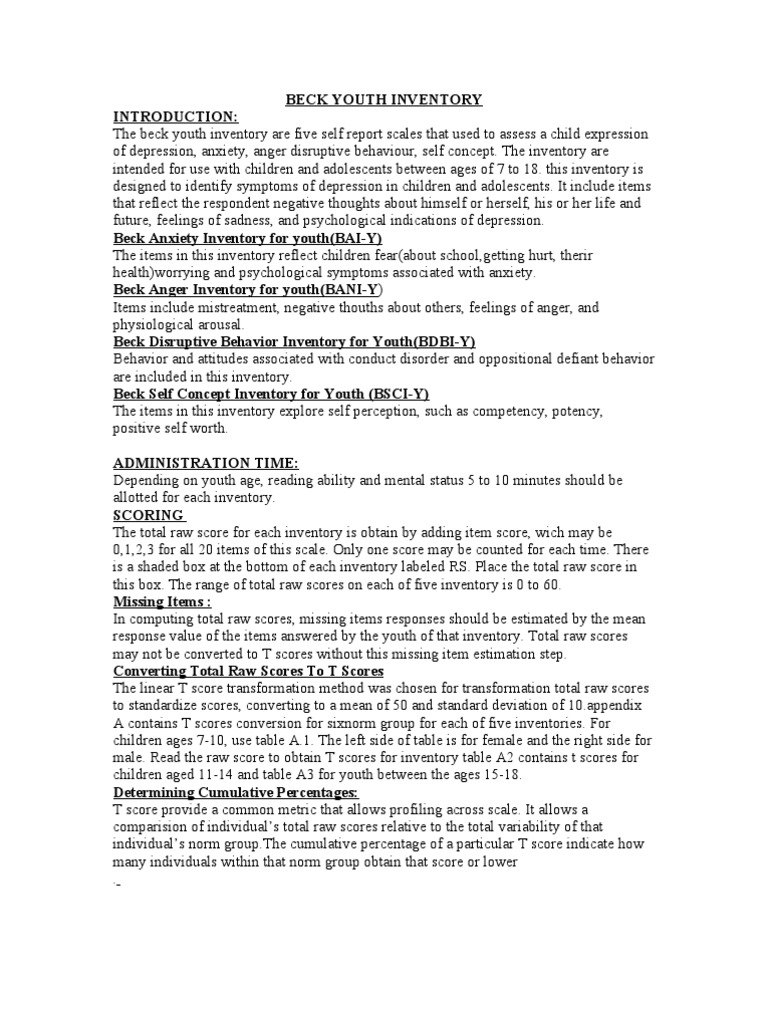Unbeatable assessment tools to help patients heal.
Beck Anxiety Inventory (BAI) About: This scale is a self-report measure of anxiety. Items: 21 Reliability: Internal consistency for the BAI = (Cronbach’s a=0.92) Test-retest reliability (1 week) for the BAI = 0.75 (Beck, Epstein, Brown, & Steer, 1988). Beck Anxiety Inventory for youth (BAI-Y) The items in this inventory reflect children fear (about school,getting hurt, therir health)worrying and psychological symptoms associated with anxiety. Beck Anger Inventory for youth (BANI-Y) Items include mistreatment, negative thouths about others, feelings of anger, and physiological arousal.

The Beck patient assessment tools help healthcare professionals measure patient needs and progress. Their specific applications range from assessing anxiety to youth emotions, and all are available for purchase using the links below.
The Beck Scales for adults and children listed below are not available from Beck Institute, but may be ordered, along with scoring and normative data, from Pearson Assessment, Inc., at 1-800-211-8378 or pearsonassessments.com.
Learn More About Cognitive Behavior Therapy
The Beck Youth Inventories—Second Edition for Children and Adolescents (BYI–II) are designed for children and adolescents ages 7 to 18 years.
Five self-report inventories can be used separately or in combination to assess a child’s experience of depression, anxiety, anger, disruptive behaviour, and self-concept.
Ease of use and flexibility of scoring allow for problem identification and prevention without extensive training. Results aid in the screening, planning, and monitoring of children and youth for educational placement and clinical treatment.
Benefits of the BYI–II
- Save time with brief screening tools
- Track students over time on the same group of integrated instruments
- Identify impaired children for referral to more extensive assessment services
- Identify potential vulnerability to bully/victimization
- Assess adolescents with special needs and low reading level
- Administer individually or in a group
- Compare BYI–II profiles of teens to BYI–II profiles of clinical diagnostic groups
- Examine the strength of the BYI–II Self-Concept measure relative to symptom strength in planning interventions
- Monitor progress
Content and Features
The five self-report inventories draw on the same principles as the widely-used Beck Depression Inventory®–II and other Beck Scales for Anxiety (BAI), Hopelessness (BHS), and Suicide Ideation (BSS).
Each inventory contains 20 questions about thoughts, feelings, and behaviours associated with emotional and social impairment in youth. The inventories are written at a second-grade reading level and may be read aloud to those with reading difficulties.
Flexible Administration
The BYI–II targets specific areas of treatment. Because the inventories are brief, children and adolescents are more likely to remain attentive and engaged while responding. The inventories can be completed prior to each clinical session, saving valuable treatment time.
The instruments measure a child’s or adolescent’s emotional and social impairment in five specific areas:
- Depression Inventory—in line with the depression criteria of the Diagnostic and Statistical Manual of Mental Health DisordersTM—Fourth Edition (DSM–IVTM), this inventory allows for early identification of symptoms of depression. It includes items related to a child’s or adolescent’s negative thoughts about self, life and the future, feelings of sadness and guilt, and sleep disturbance.
- Anxiety Inventory—reflects children’s and adolescents’ specific worries about school performance, the future, negative reactions of others, fears (including loss of control), and physiological symptoms associated with anxiety.
- Anger Inventory—evaluates a child’s or adolescent’s thoughts of being treated unfairly by others, feelings of anger and hatred.
- Disruptive Behaviour Inventory—identifies thoughts and behaviours associated with conduct disorder and oppositional-defiant behaviour.
- Self-Concept Inventory—taps cognitions of competence, potency, and positive self worth.
BYI–II Clinical Uses

- Clinical ranges for symptom severity
- Profile analysis for general understanding
- Items and item clusters as probes for deeper understanding
Norms

The inventories were developed and normed using standardization samples. T Scores allowing profile analysis to assist in conceptualizing how depression, anxiety, and anger may all be a part of the individual’s distress.
Beck Depression Inventory For Youth Free
Using the BYI–II in Schools
Beck Youth Inventory Free Pdf
- General screening
- Part of an initial eligibility determination
- Re-evaluations
- Progress monitoring of IEP goals
- Use the BYI–II with the Resiliency Scales for Children and Adolescents™ (RSCA)